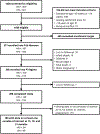The syndemic effects of food insecurity, water insecurity, and HIV on depressive symptomatology among Kenyan women
- PMID: 32482382
- PMCID: PMC8869838
- DOI: 10.1016/j.socscimed.2020.113043
The syndemic effects of food insecurity, water insecurity, and HIV on depressive symptomatology among Kenyan women
Abstract
Depression is a leading cause of disability worldwide and a major contributor to the overall global burden of disease, especially for women of childbearing age. Social science scholarship has demonstrated significant relationships between mental health, food insecurity (FI), water insecurity (WI), and HIV. Little is known, however, about the temporal relationships between food and water insecurity or the mechanisms through which these multiple stressors may operate or interact to impact depression. We therefore used syndemic theory to explore the complex relationships between FI, WI, and HIV on depressive symptomatology among Kenyan women of mixed HIV status (n=183, NCT02979418). We sought to 1) understand the temporal relationships between time-variant risk factors for depression, i.e. FI and WI, and 2) assess how these factors potentially interacted with HIV to impact depressive symptomatology. We first assessed the bidirectional relationship between WI and FI using a cross-lagged three-wave, two-variable panel model. Next, we modeled depressive symptomatology at 21 months as a linear function of the potentially syndemic interaction between FI, WI, and HIV status, adjusting for household wealth. WI had a predominant predictive effect on FI (Bayesian posterior predictive p-value=0.13); there was no reverse causality for the influence of FI on WI. The interaction effect of FI, WI, and HIV was significantly associated with greater depressive symptomatology (β=0.06) at 21 months postpartum. These data suggest that water insecurity may be an important determinant of food insecurity. Further, the co-occurrence of FI, WI, and HIV increases the likelihood of maternal depressive symptomatology, i.e. there is a syndemic relationship. These findings suggest that the role of household WI in other adverse health outcomes beyond mental well-being should be examined, and that interventions to improve mental health will be more effective if they also consider concurrent resource insecurities, regardless of HIV status.
Copyright © 2020 Elsevier Ltd. All rights reserved.
Figures



References
Publication types
MeSH terms
Associated data
Grants and funding
LinkOut - more resources
Full Text Sources
Medical

